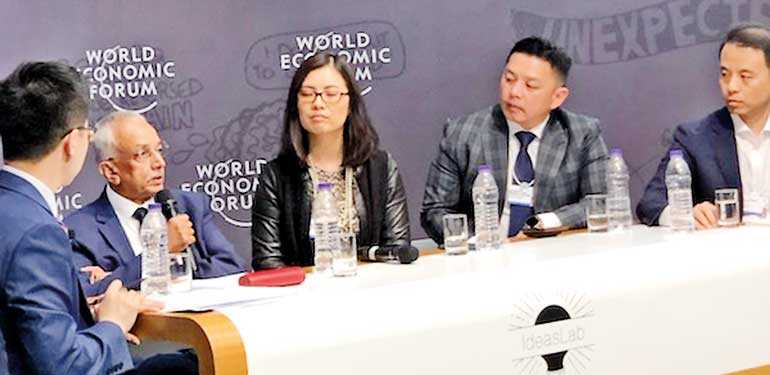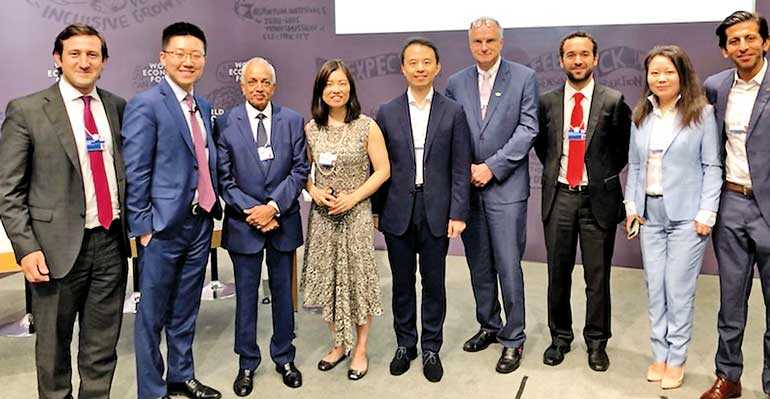Saturday Feb 07, 2026
Saturday Feb 07, 2026
Thursday, 4 July 2019 03:04 - - {{hitsCtrl.values.hits}}


While disruptions to global value chains pose several challenges, there are many opportunities for Sri Lanka to benefit from, according to Development Strategies and International Trade Minister Malik Samarawickrama. He was speaking in a panel on ‘Next Generation of Industrial Strategies in Asia’ at the World Economic Forum’s Annual Meeting of New Champions in Dalian, China. The Minister spoke alongside Malaysia’s Trade and Industry Minister Darell Leiking, Microsoft’s Manager of Artificial Intelligence Products Sophia Velastegui, and Schneider Electric’s head of Global Industrial Control and Drives in China Warren Ma.
With the changing GVC landscape, some firms in Sri Lanka are better prepared than others, Minister Samarawickrama argued. “Firms that are globally competitive and have been investing in technology, agile management techniques, and focussing on customer needs, are much better prepared. Whereas firms that are in sectors that are protected or sheltered are much less prepared,” he said.
The Minister went on to note, “The good news is that late-comers to industrialisation like Sri Lanka can actually benefit from this new wave, because digital technologies are changing so rapidly that everyone is new to it and it sort of levels the playing field. It gives an opportunity for countries like ours - with high education and trainability - to benefit and not be left behind, unlike in the previous rounds of industrialisation.” He went on to note that, “To drive digitalisation and industry 4.0, Sri Lanka has a great basis to build from - and that is our globally competitive IT industry. Our firms build software for global booking engines, IOT products for US banks, trading platforms for major world stock exchanges, and middleware solutions for big names in tech like Uber and eBay. So we are in a good place to build on and to enable industry 4.0 across the rest of the economy.”
Speaking on the changing role of Government, he remarked that, “The future will be about how Government can enable greater agility and resilience among industries, to face the disruptions taking place. A greater focus will have to be placed on improving trade facilitation, and efficient logistics infrastructure to shorten lead times, and also a focus on improving quality standards, traceability of food and agriculture products.”
An important area that was highlighted was the urgent need for Government and industry to collaborate on reskilling and up-skilling of a country’s workforce in order to face disruptions in global value chains. Additionally, in order to ensure that SMEs are not left behind in the adoption of the new disruptive technologies, that innovative schemes are introduced to incentivise collaboration between the lead firms and the smaller firms in the value chains of the lead firms to foster technology upgrading of SMEs.
Disruptions to global value chains - or GVCs - were identified across three areas: disruptions from technology and industry 4.0, disruptions from climate change and environmental sustainability issues, and disruptions due to trade wars.
Apart from technology disruptions, another key concern that was highlighted was geopolitical tensions and its impact on global value chains. On this point the Minister observed that Sri Lanka was concerned about this too, and as a beneficiary of a stable world trading system in the past any shock to this will hurt smaller countries like ours a lot more. To respond to this, the Minister argued, the Government has adopted a strategy of diversifying Sri Lanka’s trade relationships with new partners in Asia, and traditional partners in the West.
The Government has also introduced reforms to foster trade competitiveness. “We signed a comprehensive and modern FTA with Singapore last year. We have a New Trade Policy, a National Export Strategy, an Innovation and Entrepreneurship Strategy, and National Quality Infrastructure Strategy - all to gear our firms to be more competitive and prepare for this shifting GVC landscape,” he reiterated.